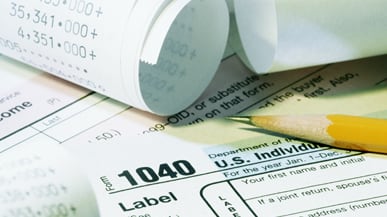From anxiety to confusion to downright hysteria, tax season is fraught with emotion. “Taxes make us feel sick to our stomach,” says Tim Pychyl, professor of psychology at Carleton University in Ottawa. “It requires us to pull together a bunch of things… and most of us don’t even understand the tax system,” he says.
True that.
The fact is some of us are better at handling stress than others and our tax strategies (or lack thereof) reflect our personalities. If you’ve yet to file--and you know who you are--there are probably deeper reasons behind your last-minute approach besides the argument that you just ran out of time. Similarly, if you filed in February (and we hate you) your diligence speaks volumes about your overall responsible nature.
What does our tax-filing behavior say about us? With the April 18 deadline looming, we tapped a few experts to weigh in on what our 1040 tendencies suggest about our overall temperaments. In all, we discovered seven tax personalities. Which one are you?
1. The Conscientious Early Bird (Who’s Also a Bit Scared). You love getting that worm. And if you’re also expecting a refund, that’s motivation enough. But why you file as soon as possible may not just be for efficiency; there are underlying emotional reasons why you feel compelled to file early, as well. You’re a “defensive pessimist,” says Pychyl. “You have a fear of failure and work proactively to get your taxes done.” The same goes for other deadline-driven aspects of your life. You finish work presentations weeks in advance and buy Christmas gifts in July. For you, fear is a motivator. Imagining the worst-case scenario–like failing to file and facing the wrath of Uncle Sam–pushes you do everything in your power to make sure that scenario doesn’t happen. Bottom line, says Pychyl: You’re extremely conscientious and have high emotional intelligence. (Whatever.)
2. The Procrastinator. You’re that person making the late-night dash to the 24-hour post office to file your taxes by midnight. And you’re not alone. According to Turbo Tax, almost 27 percent of U.S. taxpayers wait until the final two weeks before the deadline to get their paperwork in. And who can blame them? Taxes are unpleasant, especially if you anticipate having to pay. But the psychology behind this sounds awfully sophisticated. According to experts, procrastinators engage in “avoidance motivation.” “It’s the same behavior that gets people to avoid going to the dentist,” says Art Markman, a procrastination expert and professor of psychology at the University of Texas at Austin. And just as early birds use fear to motivate, procrastinators use fear to stagnate. “These are people with irrational fears who give in to feeling good (i.e. not doing their taxes) and it comes back to haunt them,” says Pychyl.

3. The Strategist. You have a system for filing your taxes. Not too early, not too late, but the taxes get done at the same time every year (say, March 15) and nobody gets hurt. You prefer to hire a professional or use special software to ease the pain. “These are people who avoid the whole unpleasantness by just creating a specific strategy for doing their taxes,” says Markman. “These are your list makers… people who’ve got a to-do list. A lot of times these are people by nature who are somewhat anxious or 'high arousal.'” Who knew! People can actually get a high off doing their taxes on time.
4. The Envelope Pusher. Do you try to deduct the cost of your clothes because you wore them to work in 2010? You’re not a straight-out liar, but you try to work the angles whenever you can when it comes to taxes—and probably life. “These people are willing to take more risks… they have more of an entrepreneurial spirit and probably consider themselves to be the smartest person in the room, which is usually the emperor with no clothes,” says Jeff Gardere, a clinical psychologist and contributor to HealthGuru.com. At worst, this personality trait could also be described as “Machiavellianism,” meaning you have a very utilitarian approach but not much moral consciousness. In a recent IRS poll, 8 percent of Americans said they believe it’s OK to cheat on taxes “a little here and there.” Meanwhile, 4 percent said it was perfectly fine to lie to the government “as much as possible.” Wesley Snipes, now serving three years in prison for “willful failure to file federal tax returns,” comes to mind.
5. The Existentialist. You didn’t file because oh, well, what difference does it make… or you couldn’t deal. You’re not trying to be a revolutionary; you just can’t get yourself to do what’s necessary. “There are so many things happening there,” says Pychyl. “On the one hand, these people could have lost the ability to cope. They’re overwhelmed and sticking their head in sand… but it could be a symptom of a larger problem like depression.” As Jean-Paul Sartre would say, they’re living in “bad faith,” i.e. total self-deception and constantly lying to oneself. They don’t see the scary truth in the expression “nothing is certain but death and taxes,” Pychyl says. “It’s someone who isn’t playing with a full deck.”
6. The Child at Heart. Do your Mommy and Daddy file your taxes, even though you’re all grown up? Sounds like you may have bigger detachment issues. “Having parents do [your taxes] means you are either consciously or subconsciously either refusing or unable to leave the mandibles of your mother’s jaws,” says Gardere. Your parents may also be paying your cellphone bill from college and helping you pay rent. Delaying adulthood, much?
7. The Luddite. Last year, nearly 70 percent of all tax returns came by electronic means, according to the IRS. That leaves almost a third of Americans still using a pen and paper. These are the same people who may also hesitate to bank electronically, for fear of Big Brother or someone stealing their identity. The truth is, filing electronically not only saves time, it’s safer and ensures you get your refund within days, as opposed to weeks.
Farnoosh Torabi is a personal-finance expert who has worked for TheStreet.com, CBS Newspath, Money magazine, NY1 News and AM New York. She's the author of You're So Money—Live Rich Even When You're Not and her new book, Psych Yourself Rich: Get The Mindset & Discipline You Need to Build Your Financial Life, was recently published by FT Press. Farnoosh is an honors graduate of Pennsylvania State University and earned a master's in journalism from Columbia University.






